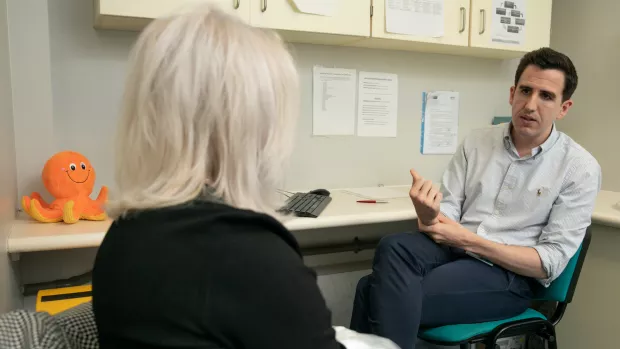
Reflecting on the past, looking to the future
Dr Emma Gray, our Assistant Director of Research, and Sasha Leigh, who lives with MS, reflect on what research has achieved in recent years.
Dr Emma Gray's view on the past and future of MS research
Huge progress has been made since I started working at the MS Society 10 years ago. Attention has turned to tackling progression, clinical trials into progressive MS, and there’s renewed focus on one day preventing MS. I’m looking forward to seeing what the next 10 years will bring.
Understanding more
We’ve seen more treatment options for people with relapsing MS. But for years we’ve been asked “what about my progressive MS?” The stock answer was “we don’t understand progression yet, and it’s hard to study”. But our answer is different now.
Ocrelizumab and siponimod are available for some people with progressive MS. We’re beginning to understand what causes progression. And our Tissue Bank and Centres of Excellence are identifying promising myelin repair and neuroprotective treatments that could slow disability worsening.
Setting up for success
To make new treatments available, we need good clinical trials that are efficient,
high-quality, and accessible to everyone with MS. So in 2015 we set up a network
of researchers, people with MS and neurologists to plan collaborative trials.
The new trials we’ve seen so far are fantastic:
- Octopus – a world-first trial that’ll allow us to test promising drugs as they’re found
- ChariotMS - one of the first trials both for people with advanced MS and with no upper age limit
- REFUEL-MS
- MS-STAT2
- DELIVER-MS
We’re proud to have shaped these trials. And I hope they find new, urgently needed treatment options.
Preventing MS
We haven’t made as much progress as we’d like in this area, and we won’t have prevented MS in the next few years, says Emma. But thanks to recent research on Epstein-Barr virus, more researchers are focused on prevention. And we have renewed plans to address it.
We’ve learned more about risk factors we can change - like smoking and lifestyle. The thought that fewer people could go on to develop MS is really motivating.
Sasha Leigh's view on the past and future of MS research
Sasha Leigh, who lives with MS, reflects on what’s exciting for the future:
After I was diagnosed with MS, I joined the Research Network. And for six years I’ve been fortunate enough to help develop the MS Society’s Research Strategy. It’s a genuine collaboration between people affected by MS, clinicians, researchers, and MS Society staff.
We all have MS in our lives in some way, but we all bring different perspectives. We all offer support as well as challenge to our debates. I feel my voice is heard, and together we make sure research focuses on what’s needed most for people with MS. Research has given so much to the MS community. But sometimes the day-to-day benefit of research can feel quite unclear.
We could feel more immediate benefit from symptom management research sooner. If we work with other conditions, and find inventive ways to deliver new services, it could make a real difference to living with MS now. I think we’re going to break some ground with the big fatigue management trial, REFUEL-MS.
Being part of something bigger
Taking part in research has helped me cope with the uncertainty of my MS. The
UK MS Register helps me get a handle on changes in my symptoms by looking at my personalised reports. And I can easily take part in other studies on its website. I’m looking forward to seeing what researchers will do with its data next.
I think of all the people who’ve been involved in research in the past. If it wasn’t for them, we wouldn’t be where we are now.
Including everyone
But we know research hasn’t represented the whole MS community. The MS Society have made this a priority. I’m looking forward to seeing change so research applies to us all. I hope research will become more inclusive for both researchers and people taking part.
We’ve come so far, but MS research is a lifetime project. I’m excited to watch the early career researchers of today become the MS leaders of tomorrow. Generations of researchers will continue to share new knowledge and stay at the cutting edge of research with the MS Society’s support.
This blog came from an article in MS Matters. Read the issue and explore the full back catalogue.


